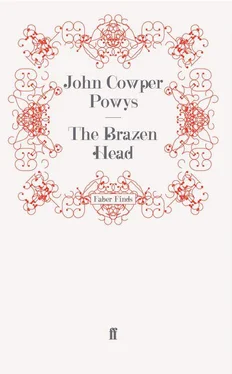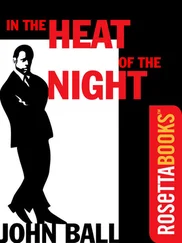“We shan’t be much longer now, reverend lord,” replied Spardo, “and once there I may find a place where I can sleep in their kitchen and my horse may be able to sleep in their stable, while you, being entertained by Baron Maldung and Lady Lilt, will come to your own conclusion about their daughter Lilith, of whom rumour round here says things I won’t repeat to a sacred gentleman like yourself.”
After that brief summary of the situation, the three of them moved on, with the saintly Bonaventura in the saddle, with Cheiron on his faithfully plodding four legs, and with Spardo’s weary head and half-closed eyes drooping and nodding more and more heavily.
Spardo’s thoughts, in spite of what he had just said, were by no means in any kitchen. They were in a much grander place. He was imagining himself luxuriating on heaps of soft cushions and sipping the particular kind of French wine, of a yellowish tint, which from his Bohemian childhood he had always loved best of all the wines in the world.
As for Bonaventura, he was thinking very hard, as he rode on, about his own future destiny. “If I continue,” he was saying to himself, “as effectively as I have done hitherto, in dominating my lower nature by my higher nature; if, in fact, I do attain in the eyes of the world the reputation of being a real saint, will this reputation interfere with my chance, for there can be no doubt I have a very good chance, of being elected Pope?
“Of course it does satisfy me to a mighty large extent to dominate my lower nature like I do, and to feel that in me, and to feel that others feel that in me, the Will of God triumphs over the Will of Satan. But with a character like mine it isn’t enough to dominate Satan in myself; I feel an imperative need to dominate Satan in others too. Yes! and not only in individuals. I feel a need to dominate Satan in groups, classes, societies, tribes, races, countries, nations, hemispheres, worlds! But my real life is my inward life. And I and God alone know the majestic secrets of my inner life.
“The wonderful thing about me, and the thing wherein I differ most from ordinary people, is that I don’t want to dominate the world by action. I want to dominate it by just being what I am; by just being myself. And in this I resemble Jesus Christ. I and God alone know what a destiny-changing moment it was in the history of Christendom when Saint Francis sought me out, among all the rest, and gave me that gift of Healing which he gave to nobody else.
“But what I and God alone know is a yet deeper secret even than that; a secret that I would not have let God know if I hadn’t decided he would have found it out for himself; the way my mother before I was born felt me give a leap in her womb every time God was mentioned. She even — and this deep secret nobody in the world knows but I and God — she even prayed to God all night long, while my father by her side was snoring like a Lombardy hog, that just one tiny little infinitesimal drop of God’s holy ethereal spiritual and invisible seed might mingle with the substance of their earthly terrestrial and mundane seeds, when she and my father became one in my begetting.
“Yes! I and God, alone in all the world, heard that prayer of my mother; and I and God, alone in all the world, know how lovely the face of my mother was — how it was transformed, transfigured, illuminated, entranced, and beside itself with mystical love, when she made that prayer. For I was in you, then, God, wasn’t I, and not in my mother’s womb? O how can I thank you enough, God, for separating me from, and selecting me out of, and putting me above, the myriads of ordinary souls whereof the world is so full! But I must think, think, think , whether it would be better for me, from now on, to go forward increasing my spirituality as a saint, or to develop that other side of sanctity which is quite as deeply natural to me and implanted in me — the sort of wisdom that Solomon had when he decided between those two women with the living baby and the dead baby. That is the sort of wisdom we need in our Pope, and if I were Pope, I would have the greatest opportunity anyone could have in the whole world to make people obey the will of God as opposed to the will of Satan.
“Perhaps,” so Bonaventura’s thoughts ran on, “the inspiration of mine about converting to God and His Church this whole outpost of Devilry they call Lost Towers does really and truly combine both the spirituality and the wisdom of a true saint. But suppose this devil of a Baron Maldung puts me to death?”
He gave a little gasp like a frog in a cave at the striking of flint and steel. “Well, in that case I wonder how far my—” But Bonaventura’s thoughts of spiritual advancement and of everlasting felicity were now interrupted by the sound of a horn quite close to them; and he quickly turned to his companion, who was evidently, although still plodding along by Cheiron’s side, so nearly asleep that he could hear nothing.
“What’s that over there? Did you hear that? For God’s sake, listen, man! It’s just the other side of those trees!”
Spardo slowly turned his head causing his long, slender, wispy beard to brush away several flies from Cheiron’s deformity. “Yes, by Holy Jesus I do hear it,” he groaned, “and what’s more, O most seraphic of doctors, I can tell you whose horn it is! It’s the horn of Bailiff Sygerius and I expect he’s calling for one of his own rascally boys! The fellow hasn’t been bailiff for more than six months. His dad, old Heber Sygerius, has only just given up the job, and I rather—”
Spardo was interrupted by an inrush upon them of several persons. A broad-shouldered, obstinate-looking, middle-aged man, who obviously was the bailiff in question, pushed forward through some closely growing pine-tree trunks, and advanced into the open, making, as he did so, several rough and brutal jerks to get rid of the hold upon his sleeve of an old and extremely agitated serf, who in his turn was clutching the hand of a little girl, who, with big frightened eyes, surveyed the two men and the deformed horse as if they had been beings from another world.
The bailiff made the appropriate gesture of respect to the man on the horse, who was obviously, although in the garb of a Franciscan Friar, some sort of high-ranking ecclesiastic from abroad.
“Pardon me for disturbing you like this, reverend Father, but I must settle the affair of this troublesome fellow before I can pay my proper respects to you.”
The serf’s voice had a piercingly pitiful tone of appeal which arrested Spardo’s critical attention at once. “You’re taking our whole life, master bailiff,” the old man was saying, “when you take away our horse. My daughter has a good job in the Convent’s washhouse and her children are good children; but if you take away our horse, considering my son’s dead, you take the bread out of all our mouths.”
It would have been clear to any less self-absorbed listeners than the two men upon whom this group of people flung itself, that in the familiar pleading tone of her grand-dad’s voice there was something that spread a reassuring atmosphere round the child who was holding his hand. Tragic enough though the old man’s words were, there were so many use-and-wont associations aroused in her by his special tone that her eyes ceased to be so big and scared.
It even began to be exciting to her to watch this weird horse’s neck, with what really looked like a human head growing out of it, while the man with the feathery beard, like the moulting tail of Granny’s jackdaw, seemed to be making funny faces at her, as if he wanted her to play a game with him.
It was early afternoon by now, and the rays of the February sun were shimmering between the pine branches at an angle about midway between earth and sky.
Читать дальше











